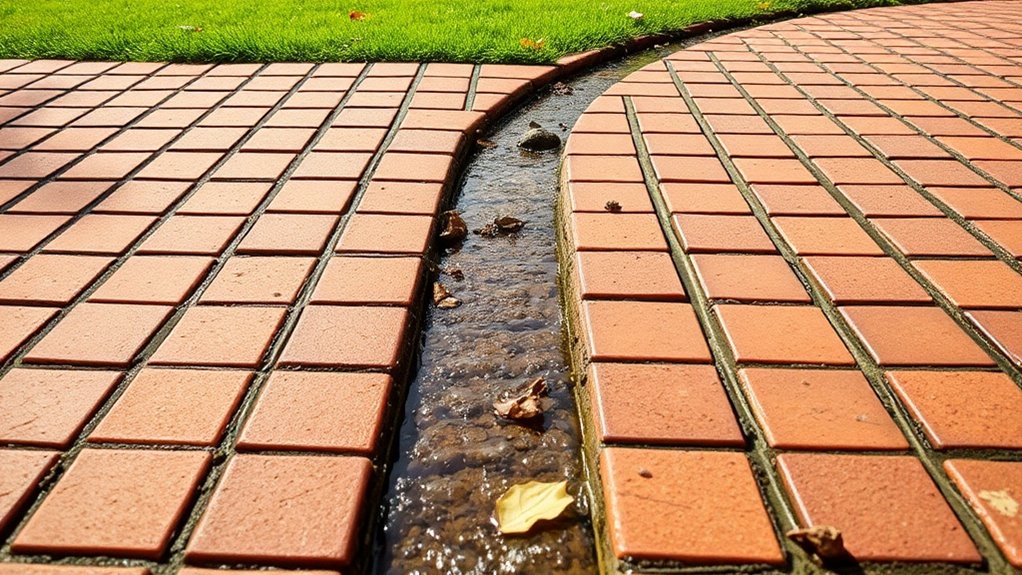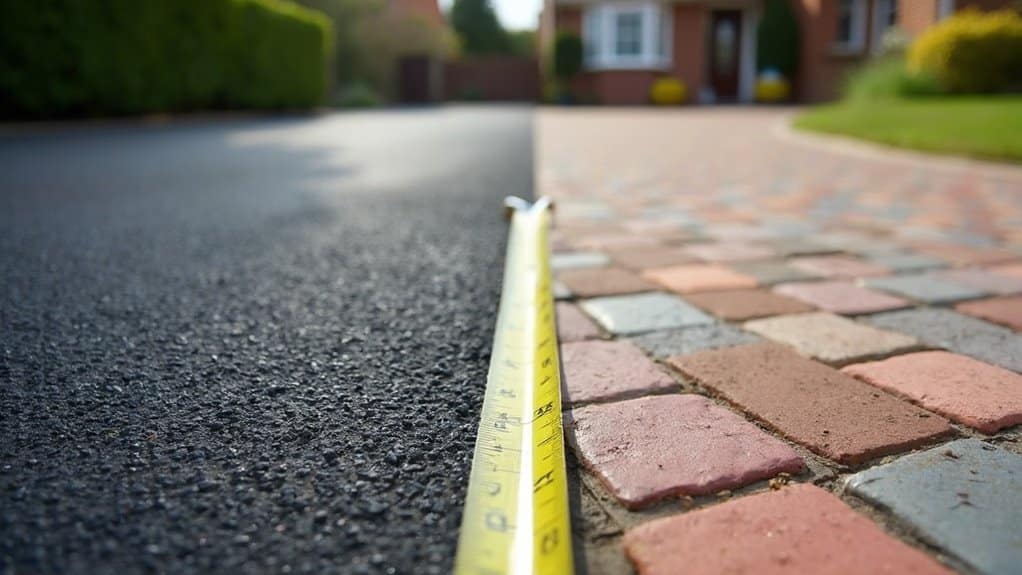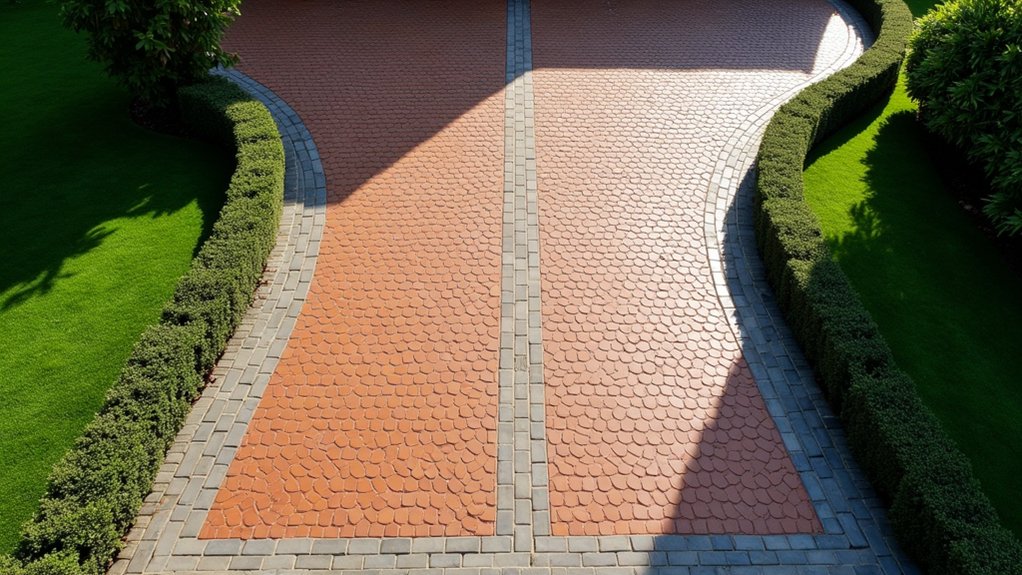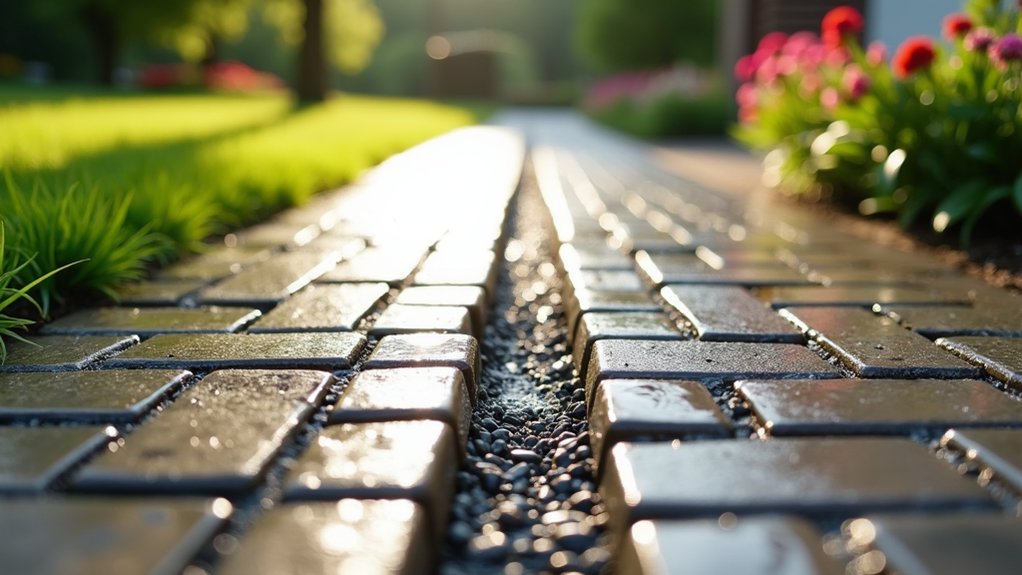Block paving driveways are fantastic for drainage due to their porous design, which allows rainwater to soak through quickly. This can reduce surface runoff by 70-90%, helping to prevent flooding and recharge groundwater supplies. They are also compatible with sustainable drainage systems, ensuring that excess water is managed effectively and protecting your property from moisture-related issues. Plus, they require minimal maintenance, making them a cost-effective choice in the long run. Explore further to discover even more advantages of block paving for your driveway.
Table of Contents
ToggleKey Takeaways
Block paving driveways can reduce surface runoff by 70-90%, making them excellent for managing excess rainwater. Their porous design allows rain to soak in quickly, which helps replenish groundwater and reduces the risk of flooding.
Many block paving systems come with integrated drainage solutions that ensure the surface remains dry, even during heavy downpours. Regular upkeep, like sweeping, is essential to keep the surface permeable and prevent blockages, which helps maintain effective drainage.
Additionally, by following Sustainable Drainage Systems (SuDS) guidelines, these driveways ensure that rainwater is managed efficiently within your property, contributing to better environmental practices.
Enhanced Water Infiltration Capabilities

As you look into enhanced water infiltration capabilities, porous pavements stand out with impressive initial infiltration rates, exceeding 1,500 inches per hour at installation. This performance is crucial for effective water management and erosion control, allowing stormwater to be absorbed quickly and reducing runoff. Although long-term infiltration rates may decrease, these surfaces still outperform traditional asphalt, averaging 10 inches per hour even after 15 years. Regular maintenance is vital; keeping up with upkeep can significantly improve infiltration rates and prevent clogging. In sandy soil environments, porous pavements excel, proving their adaptability in different conditions. Thus, investing in porous pavements enhances drainage efficiency and promotes environmental sustainability. Moreover, the infiltration capacity of permeable pavements can still exceed the minimum requirement even after extended use, demonstrating their effectiveness in managing stormwater.
Compatibility With Sustainable Drainage Systems
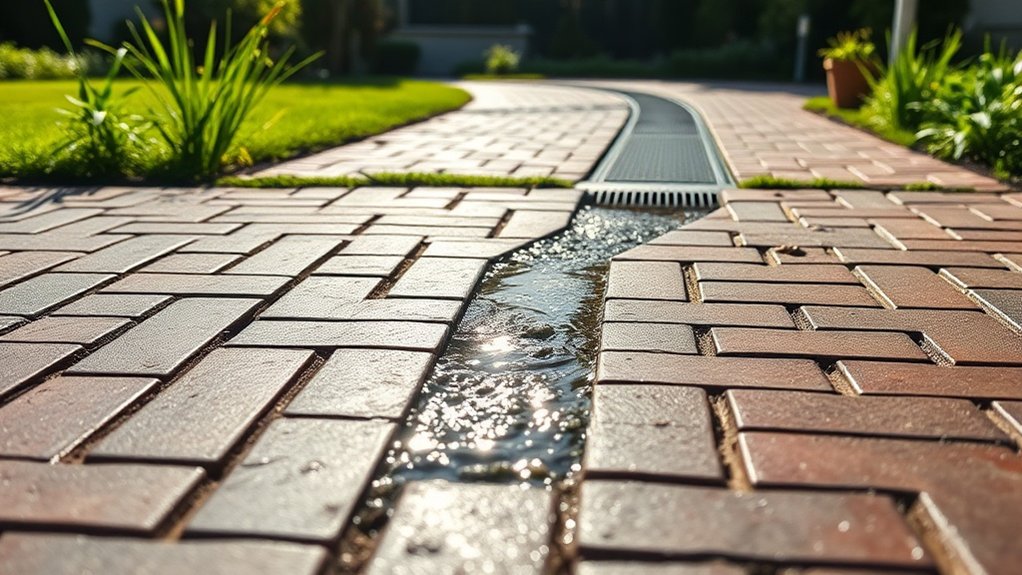
When integrating block paving driveways with Sustainable Drainage Systems (SuDS), it’s important to highlight their design flexibility. These driveways use permeable materials, allowing rainwater to soak into the ground, which significantly reduces surface runoff. By installing a permeable laying course and using permeable jointing aggregates, you ensure compliance with SuDS regulations. This setup effectively manages excess water and can be paired with soakaways and drainage pipes for optimal stormwater management. The ecological benefits are considerable: these systems help filter pollutants, recharge groundwater, and promote local biodiversity. Moreover, they meet environmental certification standards, making your project a sustainable choice in today’s eco-conscious environment. Additionally, SUDs law mandates that rainwater is managed within property boundaries to prevent flooding, which further supports the use of permeable driveways. Furthermore, incorporating permeable materials in your driveway design enhances drainage efficiency and contributes to overall sustainability.
Prevention of Flooding and Water Pooling
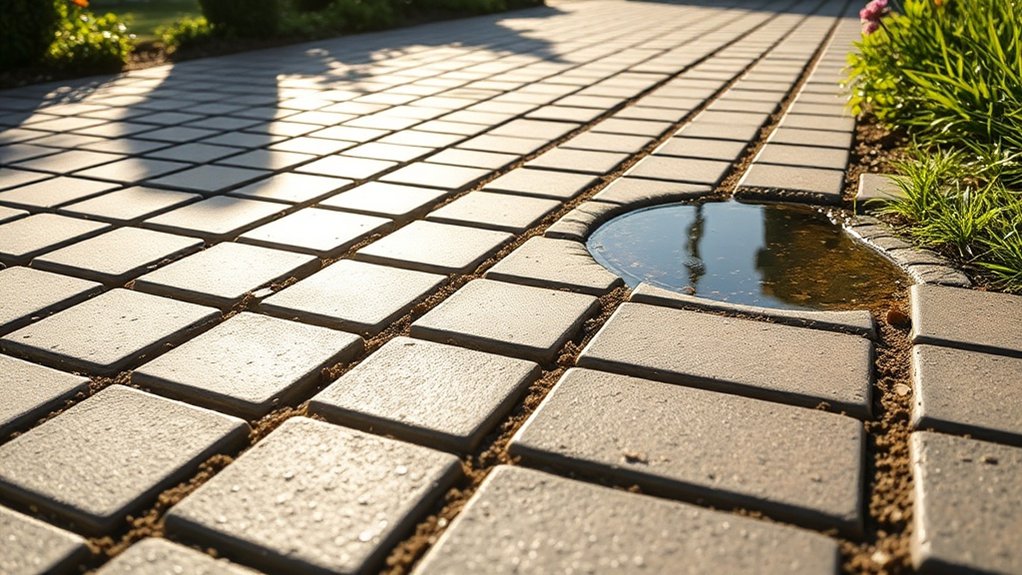
To effectively prevent flooding and water pooling, block paving driveways are designed to encourage natural water infiltration. This drainage capability can reduce surface runoff by 70-90%, effectively managing stormwater and minimising the risk of water pooling. The gaps between the blocks allow rainwater to soak into the ground, replenishing groundwater and supporting local ecosystems. The inclusion of drainage systems is essential to enhancing the overall efficiency of water management in these driveways. Additionally, implementing Sustainable Drainage Systems (SuDS) can further improve water absorption and reduce the impact of heavy rainfall.
| Feature | Impact | Benefit |
|---|---|---|
| Permeable Surfaces | 70-90% reduction in runoff | Reduces flooding risks |
| Temporary Water Storage | Delays runoff discharge | Eases strain on drainage systems |
| Integrated Drainage Paths | Minimises standing water | Improves safety and usability |
| Sub-base Construction | Prevents subsidence | Preserves driveway integrity |
| Erosion Reduction | Healthier landscapes | Promotes sustainable environments |
This design ensures a dry and safe surface, even during heavy rainfall.
Protection of Property Foundations and Structures
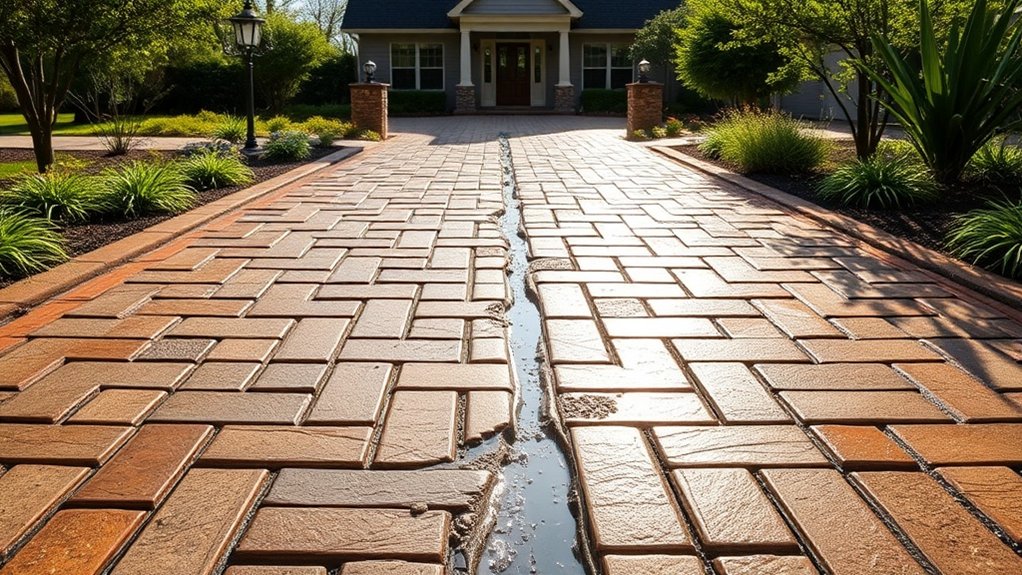
Effective protection of property foundations and structures relies on the drainage capabilities of block paving driveways. Their porous design helps control moisture, which is essential for maintaining foundation stability. By allowing water to seep through the joints, these surfaces alleviate hydrostatic pressure on foundations, helping to prevent issues such as soil saturation and erosion.
- Keeps soil moisture levels consistent beneath driveways
- Stops water from pooling around foundation edges
- Reduces the risk of foundation cracks and shifting over time
With adequate drainage, you’re not only protecting your property’s structural integrity but also prolonging the lifespan of materials like concrete and masonry. Additionally, the durability of block paving contributes to its effectiveness in managing water flow and preventing structural damage.
This proactive approach to moisture management can help save you from costly repairs and ensures a solid foundation for your home.
Low Maintenance Requirements and Cost-Effectiveness
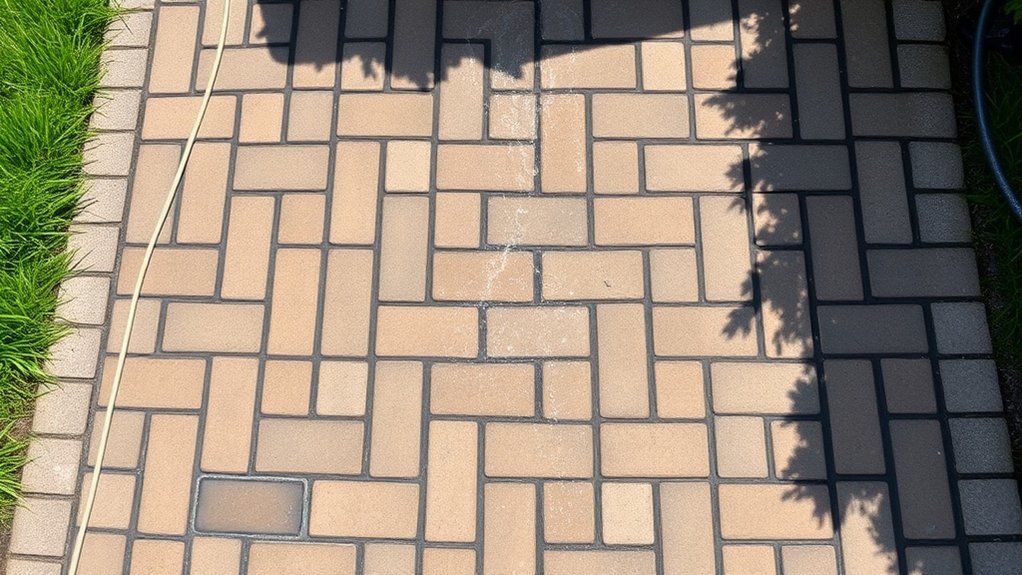
While aesthetic appeal and functionality are important for your driveway, low maintenance and cost-effectiveness are crucial too.
Block paving driveways are easy to maintain, requiring just a bit of sweeping and occasional washing. Regular sweeping helps keep debris away and reduces weed growth, while spot cleaning is sufficient in the first month after installation.
Using kiln-dried sand for jointing and sealing can effectively prevent weeds and stains.
This budget-friendly option requires minimal cleaning supplies and rarely needs professional assistance. The durability of block paving means fewer repairs, making it a smart investment.
Frequently Asked Questions
How Long Do Block Paving Driveways Typically Last?
Block paving driveways usually last between 20 to 30 years. However, with proper maintenance such as sealing and regular inspections, you could extend their lifespan to 50 years or more. Regular care can make a significant difference, much like keeping your car serviced to ensure it runs smoothly for years.
Can I Install Block Paving Myself?
Yes, you can install block paving yourself! With the right tools and a clear plan, you can create a sturdy driveway. Just ensure you follow the correct techniques for a long-lasting finish. For example, proper base preparation and accurate laying will make all the difference.
What Colors and Styles Are Available for Block Paving?
Block paving comes in a wide range of colours, from natural earthy tones to bold, vibrant shades, allowing you to create a unique look for your outdoor space. Common styles include herringbone, stretcher bond, and circular patterns, each adding its own character and charm to your driveway or patio.
How Does Block Paving Compare to Concrete Driveways?
Block paving generally outlasts concrete driveways, often lasting over 40 years. It offers a range of design options, allowing for more creativity, whereas concrete tends to be more uniform and less customisable. Overall, block paving combines durability with attractive aesthetics, making it a popular choice for homeowners.
Are Permeable Block Pavers Suitable for All Climates?
Permeable block pavers can work well in various climates, but factors like freeze-thaw cycles and heavy rainfall can impact their performance. For instance, in areas with frequent freezing temperatures, it’s essential to choose high-quality pavers that can withstand these conditions. Overall, they effectively manage water drainage while remaining durable in different environments.
Conclusion
In summary, block paving driveways enhance water drainage and integrate well with sustainable drainage systems, helping to prevent flooding and protect your property. They require minimal upkeep, making them a cost-effective choice for homeowners. It’s reassuring to know that your driveway can play a role in improving the environment while safeguarding your home’s foundation. By opting for block paving, you’re making a wise investment that benefits both your property and the planet.
Looking for an affordable driveway option? Discover the cost differences between tarmac and block paving that could impact your decision.
Get inspired by the best block paving patterns for driveways that blend style and durability; discover which layout will elevate Read more
Find effective strategies to prevent water pooling on your driveway and discover essential tips that will keep it dry and Read more

